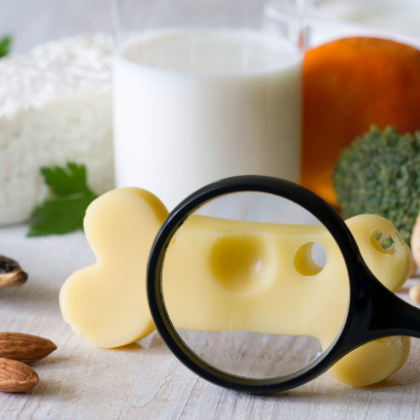
When it comes to keeping your bones healthy, you probably already know how important it is to get enough calcium and vitamin D in your diet. And yes, both of these nutrients are essential for strong, healthy bones. But there’s another potentially important bone health nutrient you should know about: vitamin K.
What is vitamin K?
Vitamin K is a fat-soluble vitamin that’s mostly known for the essential role it plays in blood clotting. It was first discovered by the Danish biochemist Carl Peter Henrik Dam in the late 1920s, when the scientist was working on cholesterol metabolism studies at the University of Copenhagen (i). During his research the scientist discovered a new substance with anti-haemorrhage capabilities, calling it koagulations vitamin (koagulation is German for coagulation, which means to clot blood).
What does vitamin K do?
Some of the many things we now know about vitamin K include:
-
It’s found throughout the body including the liver, brain, heart, pancreas and bone
-
It’s broken down very quickly in the body and excreted naturally
-
It’s found in plant foods such as leafy greens as well as in animal-sourced foods and fermented foods
-
It’s essential for blood clotting
-
It is needed for making important bone proteins
-
It may also help reduce the risk of heart disease by preventing hardening of the arteries
What are the different types of vitamin K?
Unlike most other vitamins, vitamin K isn’t a single compound but a family of structurally similar compounds. Currently there are three known types of vitamin K:
-
K1 also known as phylloquinone
-
K2 (menaquinone)
-
K3 (menadione)
Vitamin K1, found mostly in plant foods, is the type you need for your blood to clot.
Vitamin K2, on the other hand, comprises different subgroups numbered MK-4 to MK-13, with sources including animal foods and fermented foods (vitamin K2 is also produced by the live bacteria in your gut). Of these subgroups, MK-4 and MK-7 are thought to be the most important for bone health. Both are available in supplement form, though many vitamin K2 supplements use a synthetic form of MK-4 whereas those using MK-7 are made from natural fermented food sources. Another advantage of supplements that use the MK-7 form of vitamin K2 is that MK-7 is processed in the body more slowly than MK-4, which means MK-7-based supplements have longer to work.
Vitamin K3, meanwhile, is a man-made type of vitamin K that isn’t found in any natural sources. It’s commonly used in animal feed and pet food, but because of concerns over its safety in humans, it isn’t added to the foods we eat or used to make nutritional supplements (ii).
Vitamin K deficiency
Vitamin K deficiency is when you haemorrhage because your blood doesn’t clot properly and you bruise extremely easily. This is rare, however, many people in this part of the world may be running low in vitamin K, particularly vitamin K2, since the typical Western diet tends to include fewer K2 foods than K1 foods. For this reason it’s good to know where you can find good sources of vitamin K.
Vitamin K1 sources
-
Spinach
-
Broccoli
-
Asparagus
-
Kale
-
Swiss chard
-
Brussel sprouts
-
Cabbage
-
Plant oils (olive, rapeseed, soya)
-
Grapes
-
Kidney beans
-
Plums
Vitamin K2 sources
-
Butter
-
Meat
-
Egg yolks
-
Hard cheese such as Edam and Gouda
-
Natto (a fermented soya food)
-
Soft cheese such as curd cheese
-
Sauerkraut
-
Kefir (fermented milk)
Besides diet there are several other reasons your vitamin K levels may be low, such as:
-
You’re taking antibiotics (these medicines may reduce the absorption of vitamin K in the body)
-
You have a health condition that affects your ability to absorb nutrients (for example coeliac disease, ulcerative colitis or cystic fibrosis)
-
You’re older (ageing can affect the absorption of vitamin K)
-
You have frequent gastrointestinal infections (this too affects your vitamin K absorption)
-
You’ve had bariatric surgery
How is vitamin K good for bone health?
According to American Bone Health, vitamin K plays an important role in controlling bone metabolism thanks to the fact that it’s needed for making osteocalcin, a protein that helps maintain bone strength (iv). Indeed, while research into vitamin K and its role in human bone health is still on a relatively small scale, some studies have linked poor bone health with low vitamin K levels (v), with others finding an association between the amount of vitamin K in people’s diet and their bone mineral density (vi).
Out of the two main types of vitamin K, K2 is generally considered more effective for bone health than K1 – though it’s thought that not getting enough of both types of the vitamin may not be good for your bones (vi). Vitamin K2 has to date been the subject of many of the existing studies on vitamin K and bone health, with scientists having discovered it activates a protein called matrix GLA. This protein helps regulate how calcium is deposited in the body, diverting calcium away from blood vessels such as coronary arteries and towards bones and teeth (vii).
Other findings include the following:
-
A study published in the journal Osteoporosis International found vitamin K2 supplements – specifically MK-7 supplements – may help prevent bone loss in postmenopausal women (viii).
-
A review of 13 vitamin K studies suggests taking vitamin K2 supplements may reduce the risk of bone fractures in Japanese women (hip fractures, for instance, were reduced by 77 per cent) (ix).
-
A study that looked at some of the data from the large-scale Nurses’ Health Study suggests women who consume at least 110 micrograms of vitamin K each day are 30 per cent less likely to break their hip than those who eat less (x). The researchers claim low intakes of vitamin K may increase the risk of hip fracture in women, and that vitamin K requirements should be reassessed based on both bone health and blood coagulation.
-
Scientists analysing information from another large-scale study – the Framingham Heart Study – also found a link between vitamin K intake and the risk of hip fracture, not just in women but in men too (xi).
How much vitamin K do you need?
The European Food Safety Authority published its advice on daily adequate intakes for vitamin K in 2017 (xii):
-
70 micrograms for adults (including pregnant and breastfeeding women)
-
65 micrograms for teenagers aged 15 - 17 years
-
45 micrograms for children aged 11- 14
-
30 micrograms for children aged 7 - 10
-
20 micrograms for children aged 4 - 6
-
12 micrograms for children aged 1 - 3
-
10 micrograms for babies aged 7 - 11 months
The NHS, however, suggests adults need approximately one microgram of vitamin K a day for each kilogram of their body weight (xiii).
If you regularly eat lots of green veg you may well be getting enough vitamin K1 through food alone. But it’s not always so easy to get a decent intake of vitamin K2 through diet, particularly the MK-7 form of K2 – unless, that is, you eat a lot of fermented foods. Natto, for example, is a particularly good source of MK-7: one study suggests women who live in areas of Japan where they eat the most natto have a relatively lower risk for bone fractures (xiv).
So depending on what sort of foods you eat, you may need a vitamin K2 supplement to make sure you’re getting enough of this valuable nutrient to keep your bones healthy, especially as you get older. People who have a medical condition that causes poor absorption of nutrients (see above) may also need to take a supplement.
How to take vitamin K supplements
Since vitamin K is a fat-soluble nutrient, taking a supplement each day with the meal that contains the most fat will help your body to absorb it more effectively (for many people this will be their evening meal).
Vitamin K hasn’t been shown to cause any harm when taken in recommended doses (xv). However, it should be avoided by people who take certain medicines, including anticoagulant medicines such as warfarin (if you’re taking these or any other prescription medicines, always check with your GP before taking vitamin K or other nutritional supplements).
Other vitamins for bones
Besides vitamin K, other nutrients are also important for healthy bones, including:
Calcium
Good sources of calcium include milk and other dairy foods, foods fortified with calcium, fish that includes edible bones and some green leafy vegetables such as kale. You need at least 700mg of calcium a day if you’re an adult, which for some people may be difficult to achieve through food. Thankfully calcium supplements are widely available, including single supplements, multivitamin and mineral formulas and even multi-nutrient products designed specifically for bone health.
Vitamin D
If you get plenty of calcium but you’re lacking in vitamin D you’re not doing your bones any favours since vitamin D helps your body to absorb calcium from your food or supplements. Studies suggest taking vitamin D with calcium may help prevent bone loss (xvi).
The Department of Health and Social Care advises everyone in the UK to consider taking a daily supplement containing 10 micrograms of vitamin D during the autumn and winter months to combat vitamin D deficiencies (xvii).
The recommended form of vitamin D is vitamin D3 or cholecalciferol, as it’s the natural form of vitamin D the body makes when it’s exposed to sunlight.
Read more about the importance of vitamin K, vitamin D and calcium in combination for optimum bone health
Magnesium
Magnesium helps keep bones hard and rigid. In fact 70 per cent of the body’s magnesium is stored in the bones and teeth. Magnesium is also thought to be necessary to help convert vitamin D into the form that boosts calcium absorption in the body. Many people, however, may not be getting enough magnesium in their diet (sources include nuts, seeds, green leafy veg, whole grains, beans and lentils).
If you’re looking for a magnesium supplement, choose a form of magnesium that’s absorbed more readily than others, such as magnesium citrate.
Zinc
Research has shown that zinc it plays an essential role in bone metabolism and mineralisation (xviii). Scientists elsewhere claim zinc is an essential mineral required for normal skeletal growth, and that it may also be able to promote bone regeneration (xix). Like magnesium, the citrate form of zinc is thought to be better absorbed by the body than other forms. You can also try getting more zinc-rich foods in your diet such as dairy foods, shellfish, meat, bread and wheat germ.
Vitamin C
Vitamin C contributes to normal collagen formation which is essential for healthy bones. More recently, however, researchers have discovered vitamin C has other functions that may help keep bones strong too. Some have claimed the ways in which vitamin C affects how our genes work are central to bone formation, and that it may help prevent common bone-degenerating conditions (xx). Vitamin C is found in a wide variety of fruit and vegetables, but a good-quality supplement can help make sure you’re getting your fair share.
Protein
According to the International Osteoporosis Foundation, adequate dietary protein is essential for optimal bone mass gain during growth and also for preserving bone and muscle mass with ageing (xxi). In older people, for instance, bone mineral density appears to be positively linked with protein intake, with those who eat less protein being more vulnerable to factors that increase their risk of falling.
Foods high in protein include animal foods such as meat, dairy foods, eggs and fish. Meanwhile vegetable sources include soya products, nuts, seeds, grains, beans and lentils. You can also boost your protein intake by drinking protein shakes or adding protein powders to your meals – these can be convenient for those who struggle to get enough protein through food alone.
Want to find out more?
Find out more about issues that affect your bones and more ways to keep them strong and healthy by browsing the bone health section of our pharmacy health library. The library also offers guides and articles on a wide range of conditions and health subjects, including lots of self-care tips and advice to keep you informed.
References:
-
Gröber U. et al., Vitamin K: an old vitamin in a new perspective. Dermatoendocrinol. 2014 Jan-Dec ;6(1):e968490. Available online: https://www.ncbi.nlm.nih.gov/pmc/articles/PMC4580041/
-
Available online: https://www.vinmec.com/en/news/health-news/general-health-check/vitamin-k3-menadione-all-you-need-to-know/
-
Available online: https://www.nutraingredients.com/News/Promotional-Features/Vitamin-K2-MK-7-A-stability-challenge-a-market-study
-
Shea MK. et al., Vitamin K, circulating cytokines, and bone mineral density in older men and women. Am J Clin Nutr. 2008 ;88(2):356–63. Available online: https://www.ncbi.nlm.nih.gov/pmc/articles/PMC2532855/
Booth SL. et al., Associations between vitamin K biochemical measures and bone mineral density in men and women. J Clin Endocrinol Metab. 2004;89(10):4904–9. Available online: https://academic.oup.com/jcem/article/89/10/4904/2844219?login=false -
Bullo. M, Estruch. R, Salas-Salvado. J. Dietary vitamin K intake is associated with bone quantitative ultrasound measurements but not with bone peripheral biochemical markers in elderly men and women. Bone. 2011;48(6):1313–8.Available online: https://www.sciencedirect.com/science/article/abs/pii/S8756328211008751?via=ihub
-
Cundiff. DK., Agutter PS., Cardiovascular Disease Death Before Age 65 in 168 Countries Correlated Statistically with Biometrics, Socioeconomic Status, Tobacco, Gender, Exercise, Macronutrients, and Vitamin K. Cureus. 2016 Aug 1;8(8): e748. Available online: https://www.ncbi.nlm.nih.gov/pmc/articles/PMC5036986/
-
Knapen MHJ. et al., Three-year low-dose menaquinone-7 supplementation helps decrease bone loss in healthy postmenopausal women. Osteoporosis Int. 2013 Sep ;24(9):2499-507. Available online: https://link.springer.com/article/10.1007/s00198-013-2325-6
-
Cockayne S. et al., Vitamin K and the prevention of fractures: systematic review and meta-analysis of randomized controlled trials. Arch Intern Med. 2006 Jun 26 ;166(12):1256-61. Available online: https://jamanetwork.com/journals/jamainternalmedicine/fullarticle/410550
-
Feskanich S. et al., Vitamin K and the prevention of fractures: systematic review and meta-analysis of randomized controlled trials. Arch Intern Med. 2006 Jun 26 ;166(12):1256-61. Available online: https://jamanetwork.com/journals/jamainternalmedicine/fullarticle/410550
-
Booth SL, et al.. Dietary vitamin K intakes are associated with hip fracture but not with bone mineral density in elderly men and women. Am J Clin Nutr. 2000;71:1201–8. Available online: https://academic.oup.com/ajcn/article/71/5/1201/4729293
Booth SL, et al.. Vitamin K intake and bone mineral density in women and men. Am J Clin Nutr. 2003;77:512–6. Available online: https://academic.oup.com/ajcn/article/77/2/512/4689716 -
Available online: https://www.efsa.europa.eu/en/press/news/170522-1
-
Available online: https://www.nhs.uk/conditions/vitamins-and-minerals/vitamin-k/
-
Kaneki M, et al.. Japanese fermented soybean food as the major determinant of the large geographic difference in circulating levels of vitamin K2: possible implications for hip-fracture risk. Nutrition. 2001 Apr;17(4):315-21. Available online: https://www.sciencedirect.com/science/article/abs/pii/S0899900700005542?via=ihub
-
Available online: https://ods.od.nih.gov/factsheets/VitaminK-Consumer/
-
Weaver CM, et al.. Calcium plus vitamin D supplementation and risk of fractures: an updated meta-analysis from the National Osteoporosis Foundation. Osteoporos Int. 2016 Jan;27(1):367-76. Available online: https://www.ncbi.nlm.nih.gov/pubmed/26510847
-
Available online: https://www.nhs.uk/conditions/vitamins-and-minerals/vitamin-d/
-
Amin N, et al.. Zinc supplements and bone health: The role of the RANKL-RANK axis as a therapeutic target. J Trace Elem Med Biol. 2022 Jan;57:126417. Available online: https://www.sciencedirect.com/science/article/abs/pii/S0946672X19304134
-
O'Connor JP, et al.. Zinc as a Therapeutic Agent in Bone Regeneration. Materials. 2020 May;13(10):2211. Available online: https://www.ncbi.nlm.nih.gov/pmc/articles/PMC7287917/
-
Thaler R, et al.. Vitamin C epigenetically controls osteogenesis and bone mineralization. Nat Commun. 2022 Oct 6;13(1):5883. Available online: https://www.nature.com/articles/s41467-022-32915-8
-
Available online: https://www.osteoporosis.foundation/health-professionals/prevention/nutrition/protein-and-other-nutrients
-
Available online: https://theros.org.uk/information-and-support/living-with-osteoporosis/exercise-and-physical-activity-with-osteoporosis/
Related Posts
Disclaimer: The information presented by Nature's Best is for informational purposes only. It is based on scientific studies (human, animal, or in vitro), clinical experience, or traditional usage as cited in each article. The results reported may not necessarily occur in all individuals. Self-treatment is not recommended for life-threatening conditions that require medical treatment under a doctor's care. For many of the conditions discussed, treatment with prescription or over the counter medication is also available. Consult your doctor, practitioner, and/or pharmacist for any health problem and before using any supplements or before making any changes in prescribed medications.

Christine
Christine Morgan has been a freelance health and wellbeing journalist for almost 20 years, having written for numerous publications including the Daily Mirror, S Magazine, Top Sante, Healthy, Woman & Home, Zest, Allergy, Healthy Times and Pregnancy & Birth; she has also edited several titles such as Women’ Health, Shine’s Real Health & Beauty and All About Health.
View More



